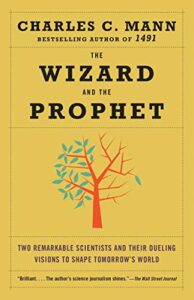To shape the future, one must study history. How we got here. Otherwise, we are doomed to repeat the mistakes of the past.
The Wizard and the Prophet by Charles C. Mann is one such history lesson worth studying. The book chronicles the lives of two men whom you have likely never heard of that played a very influential part in shaping the trajectory of modern society around the world.
I heard about the book through Seth Godin’s blog, where he called it his book of the year for 2021. Book of the year sounds hyperbolic, but it’s warranted. Although the book reads a bit like a high school term paper in spots, it is a Must Read. The Wizard and the Prophet covers the origins of all the critical issues society faces today such as climate change, food sources and GMO (genetically modified organisms), access to clean water, and energy concerns. The best part is that Mann does not promote one side or the other – the technologist or the conservationist side. He remains neutral throughout. He lays out the origins and progressions of each path and then allows you as the reader to decide which you feel is the right direction.
I found myself struggling to choose a path in many instances because there are pros and cons to each one. For example, with food, you need technology to increase crop yields to feed the number of people on the earth today; however, the technology comes with downsides such as polluted water and overworked soils. With energy, renewable sources are best for the environment, but they are not reliable nor do they supply enough energy to satisfy demand the way fossil fuels can.
At the end of the day, the issues are nuanced. It’s going to take more than 10 second made for television sound bytes to choose a side, which is what makes The Wizard and the Prophet such an important read. What became obvious to me through reading it is that instead of both sides (technologists and conversationalists) seeing each other as enemies, we as a society need to come together to find solutions that will preserve the planet so that both current and future generations can prosper for centuries to come.
As Mann writes in the book:
Our record of success is not that long. In any case, past successes are no guarantee of the future. But it is terrible to suppose that we could get so many other things right and get this one wrong. To have the imagination to see our potential end, but not have the cultural resources to avoid it. To send humankind to the moon but fail to pay attention to Earth. To have the potential but to be unable to use it – to be, in the end, no different from the protozoa in the petri dish. It would be evidence that Lynn Margulis’s most dismissive beliefs had been right after all. For all our speed and voraciousness, our changeable sparkle and flash, we would be, at last count, not an especially interesting species.

